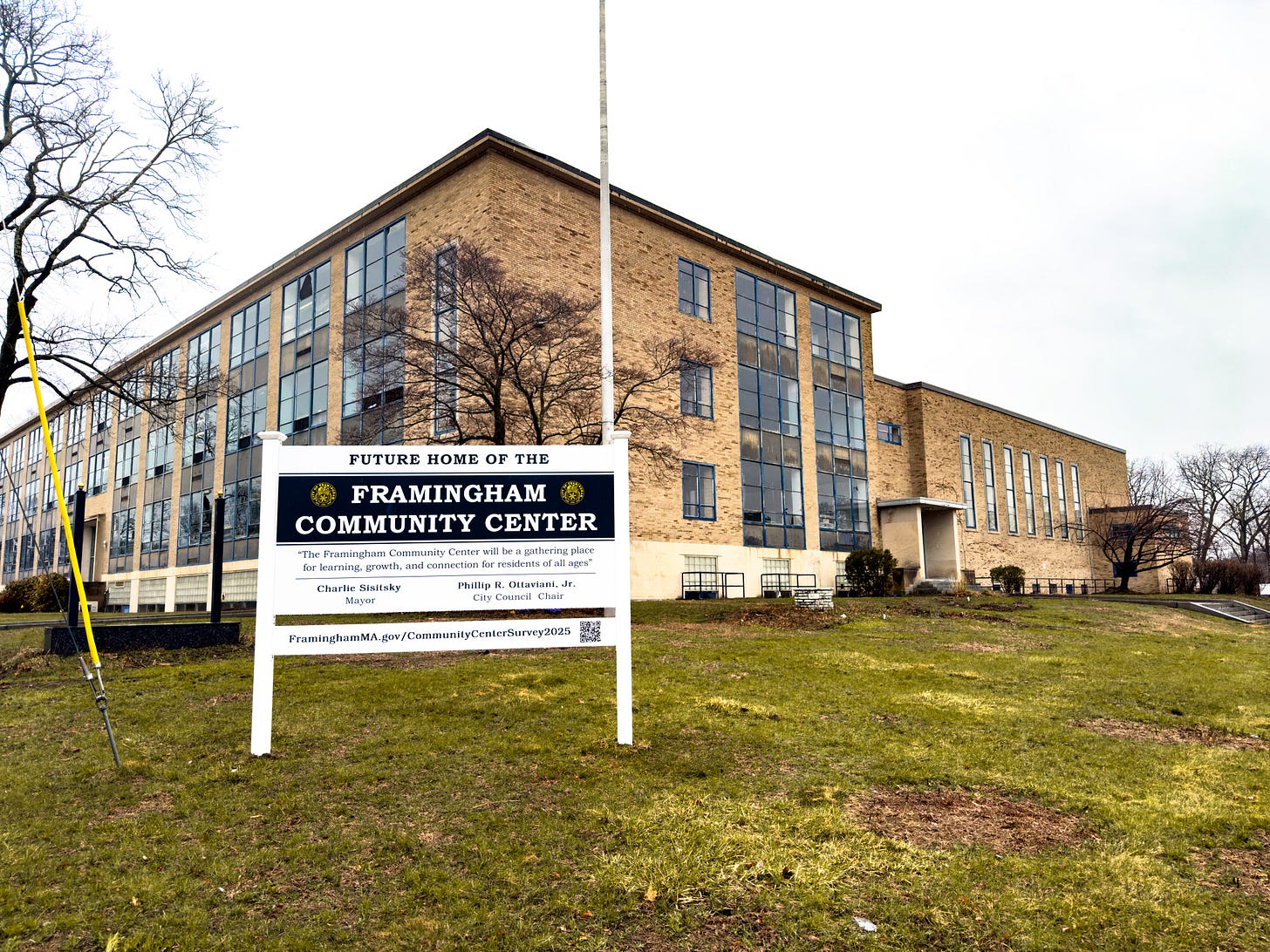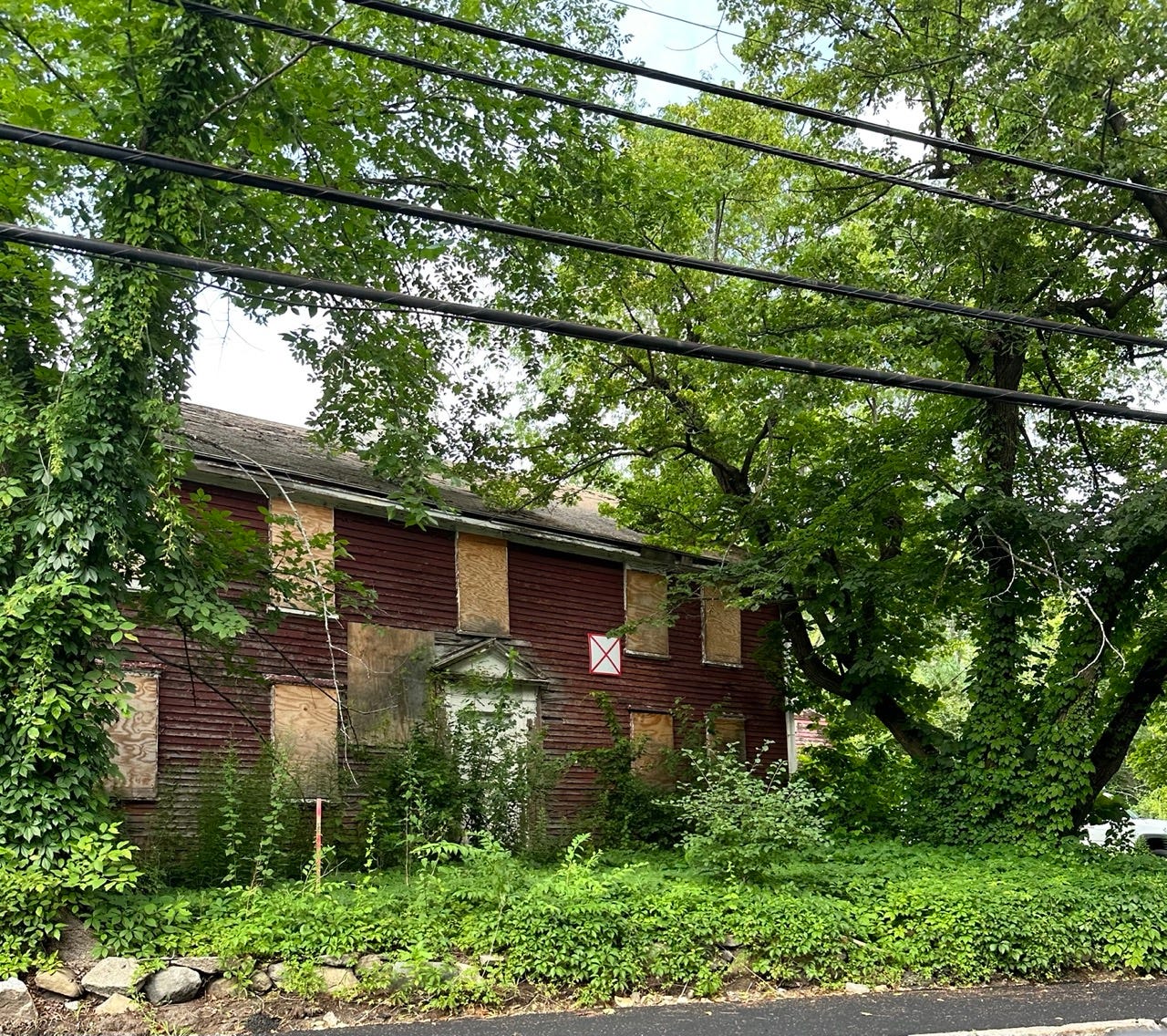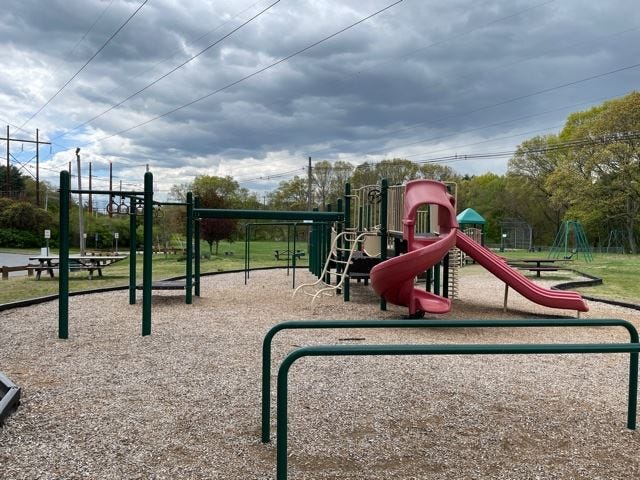🔨 The $2,746 Sign & Multimillion-Dollar Property Puzzle
Historical Commission Looks to Toughen Demo Rules | Schools Face Cuts | Reardon Park Project Hits Pause | Opinion: Massachusetts Budget Leaves Vulnerable Residents Behind | Community Events
Good evening, Framingham.
Big week in city government. We’re expecting Mayor Charlie Sisitsky’s FY26 budget before the Charter mandated deadline of May 1. According to a few sentences in tomorrow night’s Council meeting agenda, the budget will be sent to the Council before the meeting.
The School Committee also meets tomorrow night to address the $5 million gap between what the Mayor proposes and the School Committee approved in their budget negotiations on April 2. You can read more about that below.
Also, in this issue I take a look at the recent Council discussion with the Administration about all of the property the city owns, and how the Historical Commission wants to save more historical homes.
Let’s jump in…
NEWS & UPDATES
1.| Council Seeks Sisitsky Administration’s Property Management Vision

Framingham's management of its 100+ municipal properties faces scrutiny as Councilors question the Sisitsky Administration's long-term vision and financial planning for high-profile acquisitions, including the community center at the old Marian High School on Union Avenue.
The big picture: Framingham’s Chief Operating Officer Mike Tusino detailed four recent property acquisitions but faced criticism for lacking a comprehensive strategy for all city-owned properties. Council members expressed concern about ballooning costs and inadequate planning.
What they said: "What I'm not hearing is, we bought this or we have this, and these are the near-term costs that we anticipate, and this is what the long-term plan is... There just doesn't seem to have been any sophisticated care in developing what that vision is." — Michael Cannon, District 4 Councilor
By the numbers:
$2 million: Cost of 188 Concord Street building (next to the Memorial Building), purchased March 2023
$4.1 million: First-year grant for Middlesex Regional Emergency Communication Center. The grant will be used for the design and construction of the dispatch center, and in the second and third years of the project, will cover equipment and staff.
$650,000: Cost of 499 Central Street property, purchased with mitigation funds from the Millwood project
$15 million: ARPA funds allocated to Marion High School community center project, with a December 2025 deadline
Key properties highlighted:
188 Concord Street: Future home of regional dispatch center, currently houses public health clinic and parole office. Construction on dispatch center will begin this summer.
499 Central Street: Converted to affordable housing for a veteran family
84 Walnut Street: Affordable housing for a family
273 Union Ave (Former Marian High School): Future community center for performing arts and indoor sports
Between the lines: Councilors expressed frustration over:
No comprehensive capital needs assessment for city buildings
Lack of vision for underutilized properties like the former McAuliffe Library, Amazing Arts Center, Pearl Street Garage, old Station 2 firehouse, and the Athenaeum
Insufficient financial modeling for long-term property maintenance
Questioning $2,746 spent on a sign at Marian High School when overall project costs continue to rise (including misspelling Council Chair Phil Ottaviani’s name on the sign)
What's next: The Council has requested more detailed information about the city's property management strategy, with several members suggesting selling or redeveloping underutilized buildings to generate revenue.
Need a plan: “We need to have a priority list of which buildings we're going to address first, which are in most need and what the vision is for those buildings, because we certainly have not been really good capital asset managers,” said Christine Long, District 1 Councilor
The bottom line: With the Marian High School community center expected to require millions more in funding beyond initial ARPA allocations, Councilors warned that future appropriations may face greater scrutiny without a clearer vision for the city's real estate portfolio.
2.| Schools Face $2.5M in Cuts

Framingham Public Schools must still identify $2.5M in budget reductions after the Sisitsky Administration offered to cover only half of the $5M funding gap for FY26.
The difference: City and school leaders met on April 9 to address the $5M difference between the city authorized school spending and the budget approved by the School Committee on April 2. The meeting resulted in a partial solution that still requires significant cuts.
By the numbers:
$5M: Budget gap between city authorization and School Committee approval
$2.5M: Additional funding offered by the Sisitsky Administration
$2.5M: Remaining budget cuts the School Department must still make
What's next: The School Committee meets remotely on Tuesday to review the cuts outlined in a memo from Dr. Robert A. Tremblay, Superintendent and Lincoln Lynch, IV, Executive Director of Finance and Operations. The School Department’s list of proposed reductions is designed to minimize impact on student-facing positions. Cuts include the Capital Project Manager, Early Childhood Alliance Staff, a Student Support Specialist, Equity Director, technology expenses, and conferences.
The FF26 budget will be released this week.
3.| Historical Commission Looks to Toughen Demolition Rules

The update: The Historical Commission wants to stretch the city’s demolition delay — giving historic buildings a fighting chance before the bulldozers show up.
Proposed changes: The draft from the Historical Commission proposes the following:
12-month delay for most buildings 75+ years old (up from 6 months).
18-month delay if the building is on the Cultural Resources Inventory.
Stronger rules defining demolition and adding a new category: demolition by neglect.
Why it matters: The Commission says six months isn't long enough to find alternatives to tearing down historic properties. More time could mean more creative solutions and fewer empty lots and neglected historical buildings.
New process for developers: Changes to the bylaw include developers must submit photos and a property access form, which will allow city employees access to the property, pay a $100 fee (only if a public hearing is triggered), and show written proof of efforts to preserve the building if a delay is imposed.
Process in other communities: Most neighboring communities already require a 12-month wait. Framingham is looking to match or slightly exceed that standard.
What’s next: The issue is on the Council’s agenda Tuesday night. If approved, saving a piece of Framingham history could get a little easier — and demolitions a lot slower.
4.| Reardon Park Project Hits Pause
Long-awaited Reardon Park upgrades are stalled and, with it the $500,000 in Community Preservation funds are being reallocated, after cost overruns, permitting delays, and a design still in flux.
Background: Located in Saxonville along Lake Cochituate, Reardon Park has been on the top of the list for rehabilitation for several years. Back in 2022, the community came together to help create a master plan.
The cost: Initial cost estimates topped $3 million. The administration sought Community Preservation funds to help pay for the project. The Community Preservation Committee (CPC) was about to vote to approve the $500,000 request, contingent on matching municipal funds in the upcoming capital budget.
Funding fallout: The CPC found out on the day of their vote the park was not included in the capital budget. Due to cost, the city went back to the designer to scale back the project, focusing on accessible pathways connecting the parking lot, playground, basketball court, and splash pad.
Next move: As a result, the CPC voted to rescind the allocation and move $286,462 back to the CPA Fund Balance and $213,538 to the Open Space and Outdoor Recreation Reserve.
What’s else is causing delays: Eversource permits are needed because of nearby powerlines — a process that could take several months.
What’s next: Until the permits, new design and budget are in place, the Reardon Park project is deferred for another year.
OPINION
Massachusetts Budget Leaves Vulnerable Residents Behind

I’m deeply concerned that the Governor’s budget proposal does not meet the urgent needs of the people of Massachusetts. Every day, through my work and in my own community, I witness the real and growing struggles that families are facing—struggles with housing insecurity, underfunded public services, and widening economic disparities. These are not policy hypotheticals. These are the daily realities for our neighbors, our coworkers, our families.
Instead of addressing these challenges head-on, the Governor’s budget proposes cuts to critical services at a time when the need has never been greater. And meanwhile, the budget gives away more tax breaks to the wealthiest residents and corporations—those who are doing just fine.
This is a moral question. A budget is not just a spreadsheet. It’s a statement of values. And right now, that statement says that the wealthiest among us matter more than the people struggling to survive. That is a failure to meet the moment.
One of the clearest and most urgent examples of this failure is housing. The housing crisis in Massachusetts is not looming—it is already here. In MetroWest and beyond, rents are skyrocketing, homeownership is out of reach for most working families, and the emergency shelter system is stretched beyond capacity. Families are doubled and tripled up, seniors are being priced out of the communities they helped build, and people experiencing homelessness are left without options.
The Governor’s plan falls far short of what’s needed. We need a transformational approach—one that recognizes housing as a human right and backs that up with real investment. That means creating and preserving deeply affordable housing—not just market-rate units with vague promises of affordability. It means dramatically expanding rental assistance programs so people can stay in their homes. It means providing legal representation for tenants facing eviction, and making emergency shelters and supportive housing fully funded and accessible. And it means lifting up the voices of those most impacted by housing insecurity—centering their experiences and leadership in developing the solutions.
We cannot rely on the private market alone to solve this crisis. Incentives to developers may increase supply in the long run, but they do nothing for the family being evicted next week or the elder on a fixed income who can’t keep up with rent increases now. We need public investment that is intentional, targeted, and focused on equity.
We need revenue to do it. The Legislature has the tools to raise that revenue—by closing corporate tax loopholes, by ending the use of offshore tax havens, and by ensuring that those who have benefited most from our economy are contributing their fair share. The people of Massachusetts are asking for solutions, not austerity. We’re asking our leaders to be bold, to be brave, and to prioritize the well-being of their constituents over the demands of powerful interests.
This is a moment of choice. We can continue down a path that leaves people behind, or we can pass a budget that truly reflects our shared values: equity, dignity, and care for one another. I urgently hope we choose the latter.
Grace Snedden is a Community Organizer with the MetroWest Housing Coalition.
Editor’s note: Have something to share with The Ham’er community? I’m seeking opinion pieces. Email me and let’s chat about it.
COMMUNITY EVENTS
Earth Day Festival Moved to Saturday!
Due to rain last Saturday, the Earth Day Festival was postponed to THIS Saturday, May 3 from 11:00am - 3:00pm at the Framingham Centre Common.
The 2025 Framingham Earth Day Festival will offer an entertaining, educational, and family-friendly environment where participants can learn about living a more sustainable, earth-friendly lifestyle. We hope you can join us for this beautiful event.
Highlights:
Bring Electronics and other items to recycle: https://framinghamearthday.org/recycling-info/
Musical performances: https://framinghamearthday.org/live-music-and-speakers/
Yoga at 1pm
Parking: If you must drive, please note the following Parking areas that have been approved for the Festival:
Plymouth Church Parking lot, Edgell Road
First Parish Church Lot (Vernon Street). (also where electronic recycling is located)
Danforth Museum (NO PARKING allowed in the first row which is reserved For Museum patrons ONLY)
ACCESSIBLE PARKING: Village Hall Parking Lot
ADDITIONAL PARKING: Learning Center for the Deaf Parking lot, Kellogg off Central Street
The Civic Week Ahead
Monday, April 28
Tuesday, April 29
Wednesday, April 30
Thursday, May 1
In Closing…
I’ll be at the Earth Day Festival on Saturday with the Friends of Framingham Trails. Stop by and say hello!
Believe in Framingham,









